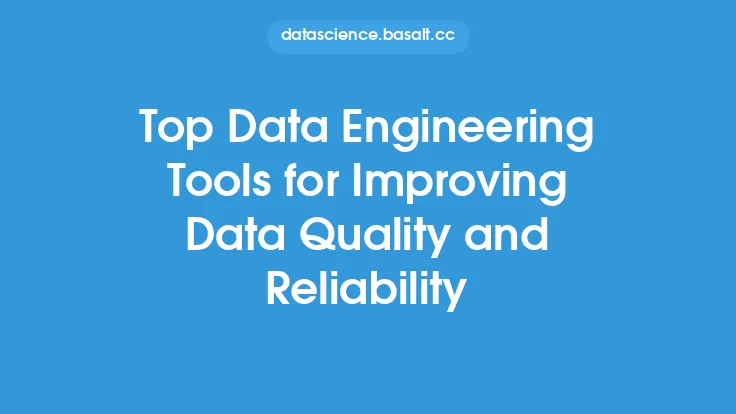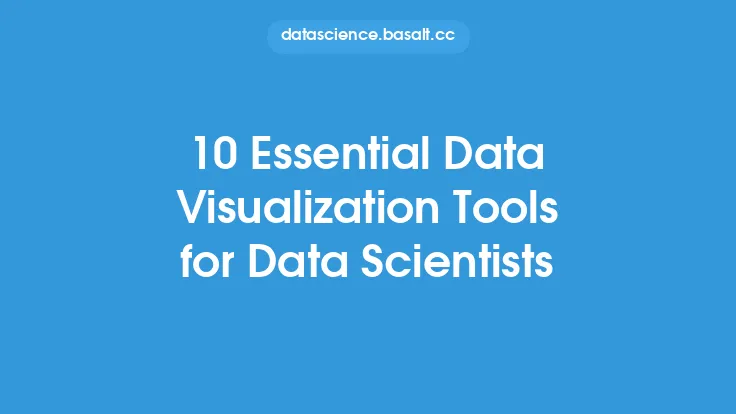Building scalable systems is a crucial aspect of data engineering, and having the right tools is essential to achieve this goal. Data engineers need to design, build, and maintain large-scale data systems that can handle massive amounts of data and provide fast and reliable access to it. In this article, we will explore the 10 essential data engineering tools that can help build scalable systems.
Introduction to Data Engineering Tools
Data engineering tools are software applications that help data engineers design, build, and maintain large-scale data systems. These tools provide a range of functionalities, including data ingestion, processing, storage, and analytics. They are designed to handle massive amounts of data and provide fast and reliable access to it. Data engineering tools are essential for building scalable systems, and they play a critical role in modern data science.
Data Ingestion Tools
Data ingestion tools are used to collect and transport data from various sources to a centralized location for processing and analysis. Some of the popular data ingestion tools include Apache NiFi, Apache Kafka, and Amazon Kinesis. These tools provide real-time data ingestion capabilities and can handle large volumes of data. They are also highly scalable and can be easily integrated with other data engineering tools.
Data Processing Tools
Data processing tools are used to transform, aggregate, and analyze data. Some of the popular data processing tools include Apache Spark, Apache Flink, and Apache Beam. These tools provide distributed processing capabilities and can handle large-scale data processing workloads. They are also highly scalable and can be easily integrated with other data engineering tools.
Data Storage Tools
Data storage tools are used to store and manage large amounts of data. Some of the popular data storage tools include Apache Hadoop, Amazon S3, and Google Cloud Storage. These tools provide distributed storage capabilities and can handle large volumes of data. They are also highly scalable and can be easily integrated with other data engineering tools.
Data Analytics Tools
Data analytics tools are used to analyze and visualize data. Some of the popular data analytics tools include Apache Hive, Apache Impala, and Tableau. These tools provide SQL-like query capabilities and can handle large-scale data analytics workloads. They are also highly scalable and can be easily integrated with other data engineering tools.
Data Integration Tools
Data integration tools are used to integrate data from various sources and provide a unified view of the data. Some of the popular data integration tools include Apache Airflow, Apache Beam, and Talend. These tools provide data integration capabilities and can handle large-scale data integration workloads. They are also highly scalable and can be easily integrated with other data engineering tools.
Data Quality Tools
Data quality tools are used to ensure the accuracy, completeness, and consistency of data. Some of the popular data quality tools include Apache Spark, Apache Flink, and Trifacta. These tools provide data quality capabilities and can handle large-scale data quality workloads. They are also highly scalable and can be easily integrated with other data engineering tools.
Data Security Tools
Data security tools are used to protect data from unauthorized access and ensure the confidentiality, integrity, and availability of data. Some of the popular data security tools include Apache Knox, Apache Ranger, and SSL/TLS. These tools provide data security capabilities and can handle large-scale data security workloads. They are also highly scalable and can be easily integrated with other data engineering tools.
Data Monitoring Tools
Data monitoring tools are used to monitor data systems and ensure they are running smoothly and efficiently. Some of the popular data monitoring tools include Apache Ambari, Prometheus, and Grafana. These tools provide data monitoring capabilities and can handle large-scale data monitoring workloads. They are also highly scalable and can be easily integrated with other data engineering tools.
Conclusion
In conclusion, building scalable systems is a crucial aspect of data engineering, and having the right tools is essential to achieve this goal. The 10 essential data engineering tools discussed in this article provide a range of functionalities, including data ingestion, processing, storage, analytics, integration, quality, security, and monitoring. These tools are highly scalable and can be easily integrated with other data engineering tools to build large-scale data systems. By using these tools, data engineers can design, build, and maintain scalable systems that can handle massive amounts of data and provide fast and reliable access to it.





